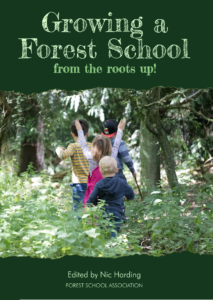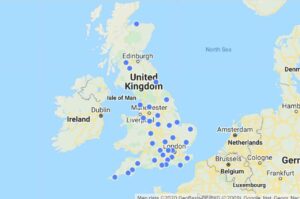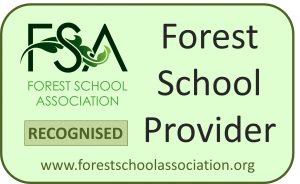Following consultation with and feedback from members (discussion link) the FSA board have agreed to make a number of significant changes to the FSA Recognised Forest School Provider Scheme. These are detailed below. Members have an opportunity to comment on these proposed changes below. Subject to these comments, revisions to the scheme are expected to be made and go ‘live’ on our website within the next two weeks. Please note that, running in parallel, the FSA will be undertaking a major consultation process on the Forest School principles. The outcome of this process may have an influence on the FSA Recognised Forest School Provider Scheme in due course but that is not expected to be completed before the end of this year.
Proposed changes:
- Create an additional tier within the scheme to allow providers who run shorter programmes to be recognised by the FSA. There will be two tiers.
- Tier 1 will have the same criteria as currently defined. This tier will recognise Forest School Providers.
- The second tier will have the same criteria as tier 1 except for the minimum duration of the programme (6 weeks). This tier will recognise providers of programmes that introduce Forest School.
- The threshold between tier 1 and tier 2, in terms of programme length, shall be ‘weekly sessions for at least 12 weeks (or one full school term) in one year followed by 12 weeks (or one full school term) in another year (encompassing a different season) with the same participants’.
- Tier 2 applicants will need to make a ‘statement of aspiration’ to deliver long term Forest School programmes. FSA directors recognise that most members already understand that Forest School is ‘a long-term process, taking place regularly, ideally at least every other week, with the same group of learners, over an extended period of time, if practicable encompassing the seasons’. Most already aspire to deliver long term Forest School programmes but face barriers to doing so. The purpose of this statement is to encourage a clear understanding of what Forest School is, both within our community and beyond. It is not requiring members to deliver long term Forest School in the future.
- In addition, the scheme will seek to learn how members are overcoming barriers to delivery of long term Forest School programmes so that these approaches may be reviewed and promoted by the FSA in the future.
- The application form and associated guidance material will be revised to reflect these changes. Plain language will also be used and the number of documents reduced in order to make the process easier to follow.





I understand why there may be a need to verify and encourage practitioners to think about and provide long-term programmes. I am sure that long-term programmes are everyone’s ultimate goal and dream if freelancing. However, I read ‘tier’ but actually I translate it as ‘LEVELS’. There is a real threat and danger of freelance practitioners being forced to put participants into these tiers as well.
“Dave is a Tier 2 child he’s been coming on a Saturday all year”
“Well Mrs Jones for Heather to move up into Tier 2 you need to enrol her into another 6 week programme”
One of the beauties of FS is it isn’t like mainstream education. By introducing such restrictions in a bid to get verification I fear freelance practitioners will consciously or subconsciously need to ‘tier’ their participants to build evidence of providing long-term programmes. By doing so I feel it is enforcing one of the most detested aspects of our nation’s Primary education system today.
I hope that the FSA will support dedicated freelancers allowing their statement of aspiration as a mark of their commitment and intention to living out the ethos and principles and are not denied access to ‘LEVEL’…’Tier 2’.
As someone who has just finished training I’ve had the opportunity to spend time with many practitioners, all of whom have faciliatated Forest School sessions which have reflected thoughtfulness and care consistent with the ethos and aims of Forest School.
The initial Training, course work and teaching, is a considerable undertaking. Surely this must be a qualification that the Forest School Association value and recognise as sufficient for registration?
As reflected in other posts, Forest School Practirioners are many and varied. It does appear that those providing bespoke programmes tailored to the needs of individuals (e.g. toddlers and young people who may not be able to access 2 hours of First School every week) may be denied registration.
I urge the FSA to recognise the commitment of all Forest School practitioners without rigid criteria that don’t seem consistent with the ethos/ aims of Forest School.
I think this is a good idea as in a lot of primary schools there is not the funding or time in the curriculum to provide the long term component.
Though it states a minimum of 6 weeks and then in the next paragraph it states 12 weeks so I’m a little unsure as to the exact time scale. What if, within a school, each group can only do half a term (ie 6 weeks)?
I like the ‘statement of aspiration’ because a lot of forest school leaders try to deliver a longer term programme as best they can within their setting.
It says that the threshold between tier 1 and 2 is, ‘weekly sessions for at least 12 weeks (or one full school term) in one year followed by 12 weeks (or one full school term) in another year (encompassing a different season) with the same participants’. Therefore, tier 2 is 6 weeks to this threshold.
Hi Gareth – does this mean that Tier 1 = 12 weekly sessions per year for two years in different seasons or more, and Tier 2 means between 6 and 12 sessions per year?
I run a group that meets every other Saturday throughout the year in term time and has been meeting for 2 years so far. They get a minimum 20 x 3 hour sessions per year plus one overnight camp. I now run consecutive groups for different ages so they can potentially come from babyhood -14 years old if they want to. But I also do work with schools and have run 6 week programmes which are now, hopefully, going to stretch to a whole term. If I am providing several different ‘formats’ and some of them fit within tier 1 but others fit within tier 2, can I still apply for tier 1? Thanks, Rose
Hours?
The proposal for Tier 1 and 2 makes no mention of the length of the sessions. Does this mean that a provider who is delivering full-days (i.e. 6 hour sessions) for a minimum of 6 sessions (but for this example 10 sessions) is providing 60 hours. Whereby a Tier 1 provider could be delivering 24 sessions of 2 hours over 2 years = 48 hours. But, a Tier 1 provider could be delivering more hours and still over all the seasons. So, the length of the sessions matters and should be entered into the equation.
Glad that everyone is being consulted and this is an open discussion. I hope that the proposal isn’t already cut and dried. Thanks everyone.
We are working on the basis that 2 hours ‘forest time’ is the minimum for all sessions. The long term element has been given more weighting in the scheme than the total number of hours or ‘intensity’ of delivery. This is due to the current definition of Forest School under the principles. The review of the FS principles may well produce something else but that is what we have to work with at present.
I’m still wondering where the map of members is in all this? I went through the verification process, was on the map as a L3 FSL got contacts as a result and now it’s gone? Sorry if this is the wrong place to ask but I can’t find a thread elsewhere.
Hello Sarah, I believe that this topic has been discussed and answered elsewhere, probably in the forum. It is relevant here inasmuch as the verified FS practitioner scheme was conceived as something of a sticking plaster to try and highlight the need for Forest School leaders to be FS Level 3 qualified at a time when large numbers of unqualified people were saying that they were doing FS. Essentially that scheme promoted 1 of the 6 principles. The FSA recognised provider scheme is a big jump forward in achieving the aim of recognising members who are following all 6 principles of FS, not just 1 of them. The FSA board will review the verified practitioner map in September.
But the verified scheme required just that? For the people to be verified and copies of their certificate ( countersigned in person by another L3) to be posted to you?
So why does it need any review?
To put it bluntly. I did what you asked, thinking as a member I’d get a useful return to be on a map of qualified FS practitioners.
I briefly got on a map which now seems to have disappeared and now apparently the FSA have removed it, without any apparent consultation with the very members they asked asked to participate in the first place?
I’m not very impressed tbh.
Correct. That is all that the verified practitioner scheme required. Just that the L3 FS qualification certificate be verified. Now that we have a much more comprehensive scheme in place the directors will need to decide how useful the verified practitioner scheme/map is in promoting the FS ethos.
I’m a provider and a practitioner but tbh I don’t often do enough regular work with regular groups to apply for the provider badge, but I am still a qualified practitioner and if people are looking for FS type taster sessions or parties or possibly more regular full fat FS sessions they now won’t find me via FSA.
It would be interesting to find out how many people are in your position. I will pass it on to Jo Phillips and the member engagement working group.
There is still a huge need for people to have their qualification verified. That hasn’t changed. I am totally with Sarah above that there is considerable demand from members for the map of verified practitioners to continue. What harm does it do, the work has been done, it was just becoming reasonably populated? The provider scheme is great for an organization (it will be good for me as soon as I can make time to do the paperwork) but not great for an individual freelancer. The FSA attracts a lot of freelancers and a typical freelancer moving around a number of sites with no income security, maybe one longer term group, work that comes and goes, is going to struggle with the provider scheme.For them to still have access to the verified practitioner scheme is so important Gareth. They are still a qualified practitioner. Look at it as the first tier with two more tiers as part of the provider scheme. Members need to be consulted about this PLEASE..
Absolutely right Deb! I do maybe one confirmed long term session as part of my work, which might comply with the provider qualification but what about all the other stuff I do which promotes FS? I promote FSA at all times, active in my local group, promote FSA at all times.
Tbh I feel very disappointed at this and feel like leaving FSA as it seems I am no longer wanted as I don’t routinely deliver many hours a day over more than 50 weeks a year, in a school setting.
I’m feeling really very disappointed about all this and am seriously reconsidering my membership.
I have a wood, I go out and engage the wider public all for free I publicise FSA at every moment. Why am I bothering?
This feels like a good start to what will inevitably be a long and ‘interesting’ process if the process to draw up the first set of principles is anything to go by. I hope the members will all contribute and help support the development and articulation. As a first thought, what happens if a provider fulfills the criteria for the top tier with some participants but not with others? Thinking of private practitioners who have more than one client school, for example.
What we do at present is state which programmes we recognise at the point of approval. Members are expected to market their activities appropriately. For instance, an introductory programme would not be marketed as being FS and other activities such as birthday parties, laser quest etc would not be described as being associated with FS at all. Many members will conduct different types of worthwhile and interesting activities in the woods that are not FS and that is fine. They must not use the FSA logo to imply FSA recognition of those activities. Members will make an annual return to the FSA so we can maintain our records on which programmes qualify and which members of staff are qualified. We anticipate the community ‘self policing’ in this regard. No one will be happy if our efforts to promote the FS ethos are undermined through inappropriate marketing.
Thank you for listening to the genuine concerns of members and responding with these changes.
Making the process more accessible, whilst providing two tiers seems eminently sensible.
I recently read a great paragraph in a Practical Pre-School book, A Guide to the Prevent Duty:
‘ Part of being in a democracy means working together to improve outcomes for all…form positive relationships and fostering a collaborative culture where everyone helps each other out…practitioners should encourage children to respect each other and consider the needs and feelings of others…encourage them to compromise and come up with their own solutions.’
Seems to me the FSA members and board are doing this. Together we will continue creating a meaningful vision and strategy. This will need to be articulated and communicated ‘clearly to others in a way that creates followership’ ( to quote, ‘Changing the Council’s Work Culture’ Gatesby Sanderson).
This all sounds good to me. We should try to be inclusive but also not lose sight of our overall principles…and none of us like paperwork!